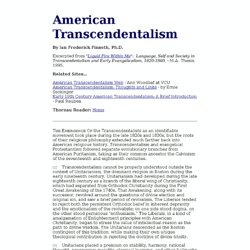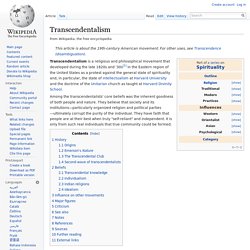Zoom
Trash

American Transcendentalism. American Transcendentalism By Ian Frederick Finseth, Ph.D.

Excerpted from " Liquid Fire Within Me ": Language, Self and Society in Transcendentalism and Early Evangelicalism, 1820-1860 , - M.A. Thesis, 1995. Related Sites... American Transcendentalism Web - Ann Woodlief at VCU American Transcendentalism: Thoughts and Links - by Ernie Seckinger Early 19th Century American Transcendentalism: A Brief Introduction - Paul Reuben Thoreau Reader: Home T HE E MERGENCE O F the Transcendentalists as an identifiable movement took place during the late 1820s and 1830s, but the roots of their religious philosophy extended much farther back into American religious history. Nature, by Ralph Waldo Emerson: Transcendentalism at the core of American Identity. Details Category: Book Reviews Published: 09 November 2008 Written by Bénédicte Leude Ralph Waldo Emerson was born in 1803 and died in 1882.

Transcendentalism. Transcendentalism is a religious and philosophical movement that developed during the late 1820s and '30s[1] in the Eastern region of the United States as a protest against the general state of spirituality and, in particular, the state of intellectualism at Harvard University and the doctrine of the Unitarian church as taught at Harvard Divinity School.

Among the transcendentalists' core beliefs was the inherent goodness of both people and nature. They believe that society and its institutions—particularly organized religion and political parties—ultimately corrupt the purity of the individual. They have faith that people are at their best when truly "self-reliant" and independent. It is only from such real individuals that true community could be formed. History[edit]